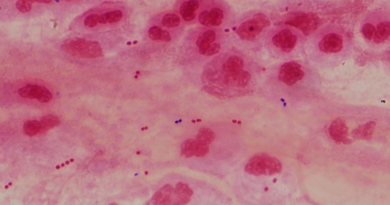From my perspective: Dr. Ethan Roy shares his experiences as a graduate student at Baylor
From the Labs interviewed Dr. Ethan Roy to learn about his challenging beginnings in the lab, his fascination with neurodegenerative diseases and his plans to make a career in one of the ‘final frontiers’ of science and medicine.

-
What led you to choose this area of research for your doctoral work and specifically the lab you are in at Baylor?
Before I came to graduate school I worked in a lab on a fascinating project relating to Alzheimer’s disease. The experience introduced me to the Alzheimer’s disease field, which is very large and involves every aspect of biology. When I was searching for graduate schools to apply to, I found the interesting work at the Hui Zheng lab here at Baylor and reached out to her. She encouraged me to apply, and I did my first rotation in her lab. My other rotations were also in labs studying Alzheimer’s disease, but I ended up joining the Zheng lab to continue work on what I thought was a pretty neat project at the time.
-
When you are talking with non-scientists, how do you explain your work and its importance?
Most people are familiar with Alzheimer’s disease, and usually they know at least one person who suffers or has suffered from it. For my work in particular, I tell them that I study the hypothesis that inflammation in the brain is a key player in the disease, and that I believe targeting that is going to be a promising strategy to treat the condition. I think my work recently published in the Journal of Clinical Investigation has contributed to a better understanding of this complex disease.

-
Are there any moments from your work on this project that particularly stand out either as an exciting discovery or a specific challenge/road block you had to overcome?
My biggest challenge was about the neat project that I started after joining the Zheng lab, which I mentioned above. It actually completely tanked after a couple years of hitting numerous disappointing dead-ends. Although it was pretty painful at the time, I look back on it as a great training experience. I’m now able to think a little more outside the box to try to answer scientific questions, and have a better sense of whether certain approaches are worthwhile. After abandoning that project, Dr. Zheng and I came up with some new ideas to test with the help of Dr. Wei Cao who came to join us from MD Anderson. With Dr. Cao’s help and expertise, we were able to make some very interesting findings.
-
How has being at Baylor helped you overcome obstacles during your time in the Ph.D. program?
Apart from all the help I’ve gotten from my principal investigator and other people in the lab, I’ve had a very supportive committee who always offered great suggestions and encouragement, and the people in my graduate program have been very helpful when any problems came up.
-
Has being at Baylor opened unexpected possibilities for your professional development?
Part of my graduate program’s requirement for Ph.D. students was regular exposure to clinical medicine, so I had the chance to shadow my clinical mentor, Dr. Claudia Robertson, who leads the Neurosurgery Intensive Care Unit at Harris Health’s Ben Taub. I would attend weekly rounds with her and the Baylor neurosurgery residents to listen to their care strategies for each patient in the Neonatal Intensive Care Unit. Rarely do Ph.D. students have this kind of opportunity, and it was very intriguing to see the clinical practice of treating diseases of the brain in real people.
Apart from this, Baylor is able to attract top speakers for invited lectures, which is a huge advantage. Over the course of my graduate school training, I’ve been able to attend talks by many of the biggest names in my field, which has been a real treat. Also, being located in the Texas Medical Center has been beneficial, with numerous Alzheimer’s disease–related conferences and events nearby, such as the annual Nantz Symposium and the Alzheimer’s Association Research Symposium. Not being in a multi-institutional center like the Texas Medical Center would have made it difficult to get this amount of exposure.
-
What are your future career plans and how did working on this project contribute to your goals?
Because neurodegeneration has been such a fascinating topic to study, I definitely see myself pursuing it as a career, whether or not I continue studying Alzheimer’s disease in particular.
As a group, neurodegenerative diseases affect so many people, and to me it feels like a ‘final frontier’ in medicine with much of the knowledge and clinical progress yet to come. My time in graduate school has been an excellent opportunity to be introduced to this field and develop a solid base of expertise with which to begin my research career.
-
What are your favorite things to do outside the lab? Has living in the Houston area helped you enjoy those activities?
My favorite hobby is hiking, so living in Houston actually hasn’t helped me enjoy that particular activity at all! I had to fulfill that by travelling elsewhere, but because Houston is a major city with many transportation options, this travel has been easy. There are many nice parks with walking trails here that I enjoyed in the meantime. Another thing I’ve taken advantage of here has been the wide range of international restaurants, like Ethiopian, Vietnamese, and (authentic) Chinese. Overall I’ve really come to like living in Houston.



